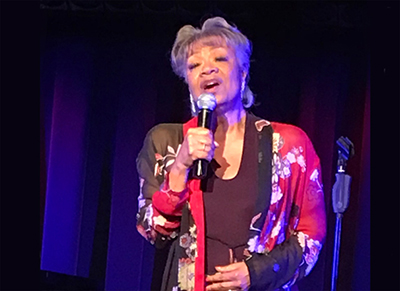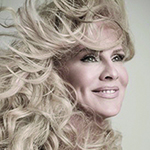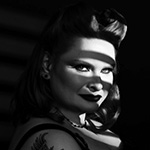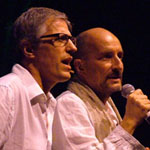Cynthia Clarey
Bridge Over Muddied Waters
Laurie Beechman Theatre, NYC, February 5, 2023
Reviewed by Alix Cohen

Cynthia Clarey had a successful career as an opera mezzo, yet she’s savvy enough to transition to cabaret without playing to the balcony. Neither gesture nor evangelistic volume were exaggerated. In fact, she vibrated with intensity. (Today the vocalist is a contralto who, I’m told, has a range comparable to a male baritone or tenor, as she sings comfortably and frequently in the octave below middle C.)
Peppered with historical reference, this was a personal show with a universal message: the end to bigotry and prejudice. Bigotry is a conscious choice to hate something or someone and to think oneself to be superior, while prejudice is a pre-existing feeling, instilled before one knows a person or thing.
“My people came to this country in shackles and though you can’t see them, they’re still there. Through it all, we’ve had our music and our faith,” she began. The spirituals “Lord How Come Me Here” and “Steal Away” were gorgeous. Predominantly sung a cappella with a well-placed emotional warble and outstanding phrasing, they got under one’s skin like stealth missiles. A rendition of the iconic “Strange Fruit” (Abel Meeropol aka Lewis Allan) followed, replete with a mournful hum. This performer is an actress. Anger, impotence, and despair are conveyed in particularly low, resonant octaves. “Why must the human race sink so low?”
Inspired by a police brutality incident witnessed by one of its songwriters, 1971’s “What’s Going On?” (Renaldo “Obie” Benson/Al Cleveland/Marvin Gaye) was answered with the rap number “I Don’t Know,” written by Clarey and identified as “my granny rap.” Although it was effectively accompanied by bongo drum, vocally emphasis on selective words would have made this more infectious.
“It’s All White with Me” (Sandy and Richard Ricardi’s parody lyrics to Cole Porter’s “It’s All Right with Me”) carried an unexpected punch:“I willed up a wall to keep the wrong sort out/And I’ll make you pay for it too.” It was hyper-conservative and frighteningly on target. The program offered a well-chosen response with “See Me as I Am” (Harriet Reynolds): “I laugh and love and cry just as you do.” A delicate piano supported the passion, symbiotically shifting with every vocal change. This was a proud plea, one that was not cowed.
Sam Cooke’s “A Change Is Gonna Come” emerged with Clarey’s eyes closed, as she nodded in agreement. Head tipped back and hands fisted, Clarey swayed as though she were channeling. Her grit-and-sand voice added pith. “Please, please, please, please, please” she intoned, knees slightly bent under the burden.
Released 35 years ago on March 7, 1985, “We Are the World” (Lionel Richie/Michael Jackson written and recorded as a benefit for the famine-stricken Ethiopia) retained its impact and sonority. Pianist Beckie Menzie tellingly echoed the lyrics. There was a missed opportunity to get the audience (a flock) to join in a chorus. “There are more drugs, more police brutality, more war on each other…When are we gonna learn?!” she rhetorically asked. Bob Russell and Bobby Scott’s “He Ain’t Heavy, He’s My Brother” was delivered, as was the entire show, with soul and purpose.
An encore of “Ol’ Man River” (Jerome Kern/Oscar Hammerstein II) began in a higher octave but then descended to the level with which we are familiar. The difference added immeasurably.
I was confused by the inclusion and placement of several songs. The choice of beginning with Luther Vandross’ celebratory “Brand New Day” contradicted the theme of an evening that spoke to a frustrating lack of change. A beautifully arranged and performed “Let’s Face the Music and Dance” (Irving Berlin) sounded like a “fiddle while Rome burns” resignation, not at all consistent with the show’s message. Director/MD/pianist/vocalist Menzie’s solo on “I Was Here” (Lady Antebellum) landed oddly as sung by a White woman in this context. Was it meant to suggest being a witness?
Cynthia Clarey’s regal presence and individual likeability were as compelling as her phrasing, investment, and, of course, her message. She hopes to take this show to schools. A sense of inclusion suffused the evening. In spite of my reservations, this powerful evening was well sequenced and introduced. The artist employed her unusual voice to its best advantage. (I’d love to hear her sing Motown). The direction was subtle, the accompaniment was rich without taking over. With luck, she’ll be back in New York (she’s from Chicago) repeatedly in years to come.
Irwin Berkowitz was the percussionist.





